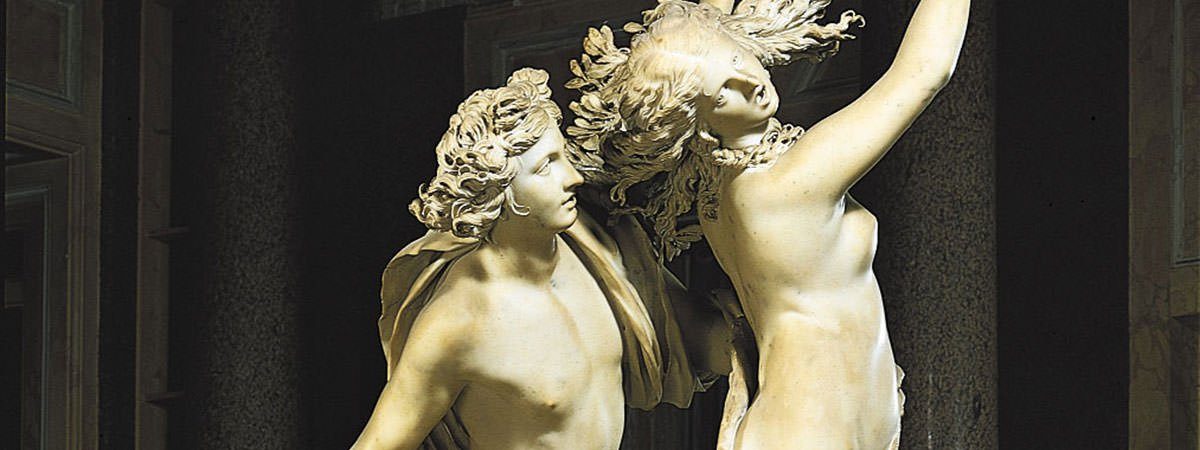Apollo was an influential and widely venerated deity in Ancient Greece who served numerous functions. Among other things, he was the god of music, healing, thesun, light, oracles, knowledge, diseases, poetry, dance, archery, herds and flocks, and protection of young. According to Greek mythology, Apollo was the son of Zeus, king of the gods, and the Titaness, Leto. Upon being born, Apollo was fed with an immortality drink called ambrosia due to which he became instantly a man. He then went on to slay the serpent Python who had troubled his mother Leto while she was pregnant. There are numerous other myths featuring Apollo. Some of these myths are related to him being a God of Music and how others challenged him to a contest. Some are also related to his male and female lovers. Here are the 10 most famous myths featuring the Greek God Apollo including Apollo And Python; Apollo And Daphne; Apollo and Cassandra; Apollo And Hyacinth; and his role in the Trojan War.
#1 Birth of Apollo
In Greek mythology, Apollo is the son of Zeus, king of the gods, and the Titaness, Leto. He is also the twin brother of Artemis, the Goddess of the Hunt. When Hera, the sister-wife of Zeus discovered that Zeus had impregnated Leto, she cursed her not to find a solid ground or island on earth to give birth to her children. In labor and massive pain, Leto wandered all over Greece to find a place to give birth to her children until she found Delos, a barren and floating island. According to myth, it was Zeus who emerged Delos from the sea so that Leto would find a place to bring forth her offspring. The delivery of Artemis was painless but the birth of Apollo was painful and treacherous because by then Hera had kidnapped Eileithyia, the goddess of childbirth. It was Artemis who assisted her mother with the birth of her younger twin brother Apollo. Everything on Delos turned into gold when Apollo was born clutching a golden sword. Due to Leto’s inability to feed the newborn, Themis, the goddess of divine law, fed him an immortality drink called ambrosia. At the first taste of ambrosia, Apollo immediately transformed into a man. Moreover, Apollo came to be regarded as the most beautiful Greek God.
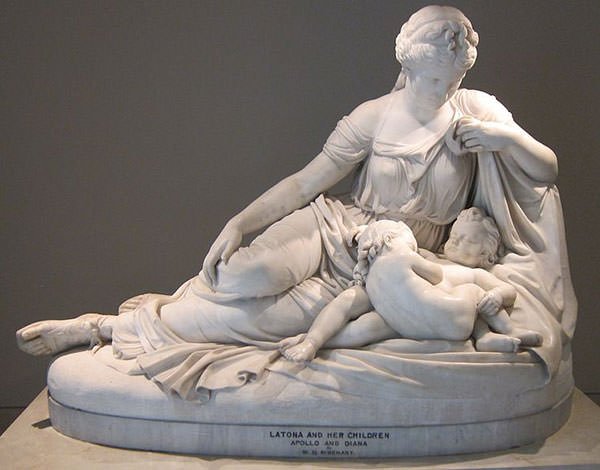
#2 Apollo And Python
Python was traditionally the child of Gaea, the personification of earth. Initially known to be a female, Python was a subterranean serpent and was represented as a medieval-style dragon at times. According to Greek mythology, Delphi was the center of the earth and thus, Python was the guardian of the Delphi. When Hera discovered that Leto, the daughter of Titans Coeus and Phoebe, was pregnant with the child of Zeus, she sent Python to kill Leto. Nonetheless, Leto was able to give birth to twins, Artemis and Apollo. Moreover, after consuming a drink called ambrosia, Apollo immediately transformed into a man. In order to avenge the trouble given to his mother while she was pregnant, the young Apollo immediately set out to kill the serpent with his silver bow and golden arrows that he had received from Hephaestus, the blacksmith. Apollo went to the creature’s cave and pierced him right on its forehead, leading to Python’s death. After this act of vengeance, Apollo took the creature and buried it under the slopes of Mount Parnassus and built the oracle of Delphi, the most famous oracle of ancient Greece. Apollo’s role as the slayer of the Python led to his association with battle and victory.
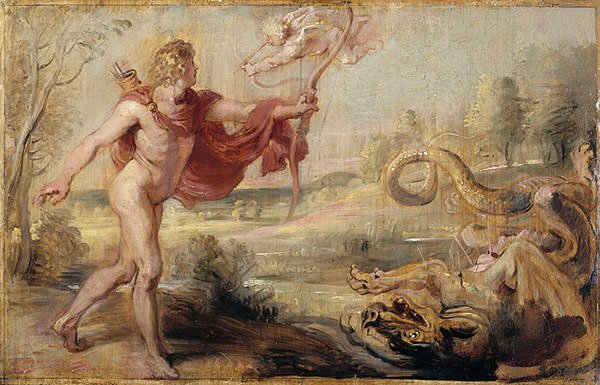
#3 Apollo And Admetus
Though Apollo was able to kill Python, according to the laws of Mount Olympus, he had committed a crime. Due to this, his father Zeus exiled him from Mount Olympus for a period of time. Admetus, the son of Pheres, was the king of Pherae in the region of Thessaly. During his exile, Apollo arrived in Thessaly to work as a herdsman under Admetus. As Admetus was a good and fair employer, Apollo promised him all kinds of assistance in gratitude for the kind treatment he received during his period of servitude. After Apollo completed his allocated time in exile, he went to Mt. Olympus as a god. Meanwhile, Admetus fell in love with Alcestis, the daughter of King Pelias. Accordingly, he asked for Alcestis’s hand from her father. However, King Pelias didn’t want his daughter to marry Admetus and he thus put up a condition that in order to marry his daughter, Admetus would have to ride into the city in a chariot pulled by a lion and a wild boar. As such a task was impossible for a mortal, Apollo helped Admetus and harnessed up the two beasts. Thus, living up to task given by Pelias, Admetus was able to ride the chariot successfully and married Princess Alcestis. Apollo was present during their wedding to give his blessings and bestowed Admetus with a kind of immortality.
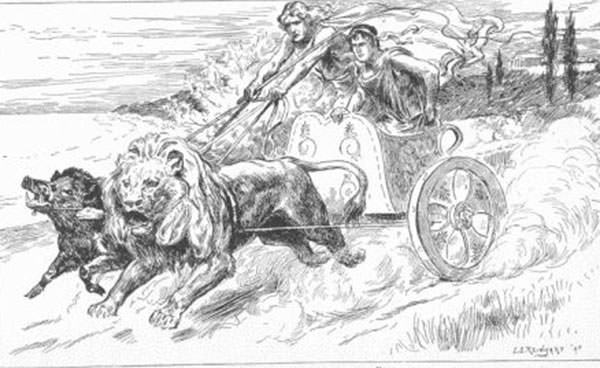
#4 Apollo And Niobe
Niobe was the daughter of Tantalus, the wicked king of Sipylus; and the wife of Amphion, the king of Thebes. Niobe and Amphion gave birth to fourteen children, seven sons and seven daughters. At a ceremony held in honor of Leto and her son Apollo, Niobe boasted that she was more fortunate than Leto, because she had more number of children than her. When Artemis and Apollo heard about the insult, they got enraged and at once, came down to Earth to kill all the fourteen children of Niobe. Artemis took the responsibility of killing all the daughters while Apollo killed all the sons with his lethal arrows. Niobi lost her entire family within a matter of moments and had to pay a high price of her arrogance. Devastated, she fled back to Mount Sipylus and was turned into stone. The Weeping Rock in Mount Sipylus has been associated with the myth of Niobe from ancient times.
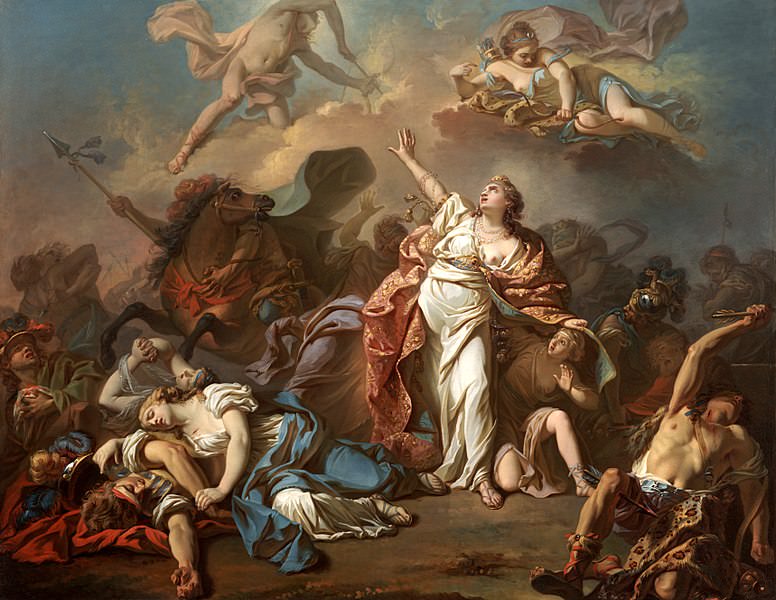
#5 Apollo And Marsyas
Marsyas was a satyr from Phrygia, in today’s Central Turkey. He found an aulos, a double-reed wind instrument which was abandoned by Greek goddess Athena. After becoming skilled in playing it, Marsyas boasted about his musical skill and claimed he could produce music far superior to that of Apollo. He went further and decided to challenge the Greek god to a musical contest. The contestants agreed to take turns displaying their skills and the rule was that the victor of the contest would do whatever he wished with the loser. The contest was judged by the Muses, the Greek goddesses of Art and Science. At first, Marsyas played his flute and weaved wonderful melodies. Then Apollo played notes full of harmony with his lyre and also added his melodious voice to his performance, mesmerizing the audience. Due to Marsyas’s inability to play and sing at the same time, Apollo was declared the winner. As per the designated rules of the contest, Apollo chose a harsh punishment for Marsyas because of his audacity to challenge a god. He pinned Marsyas to nearby pine-tree and flayed him alive. However, Apollo soon repented and being distressed at what he had done, he tore the strings of his lyre and decided to stay away from music for a while.
#6 Apollo And Midas
Pan, the Greek god of shepherds, was a great musician who was known for his invention of the syrinx, or Greek pan flute. Believing himself to be greater than Apollo, Pan challenged the Greek god to a musical duel. Tmolus, the mountain-god was chosen to be the umpire of the musical contest because of his age old wisdom. The followers of the two gods came to witness the contest including a particularly devout mortal follower of Pan named Midas. At first, Pan blew on his reed pipes and produced a rustic melody which made birds hop from their tree top perches; squirrels left their holes and the trees swayed to the sounds. Then, Apollo struck the strings of his lyre and produced spell-binding tunes. The wild creatures of the wood crouched still as stone, the trees kept every leaf from rustling and the gentle air was as silent as a dream. When the music stooped, all listeners had a feeling of grief, as though they had just said goodbye forever to their own mothers and fathers. When the spell of Apollo’s music was broken, the audience fell at Apollo’s feet and Tmolus immediately proclaimed him as the winner. Everyone was pleased with the judgment but Midas dissented and questioned the justice of the award. Bemused and furious, Apollo touched the ears of Midas and made them long, pointed, and furry; the ears of a donkey!
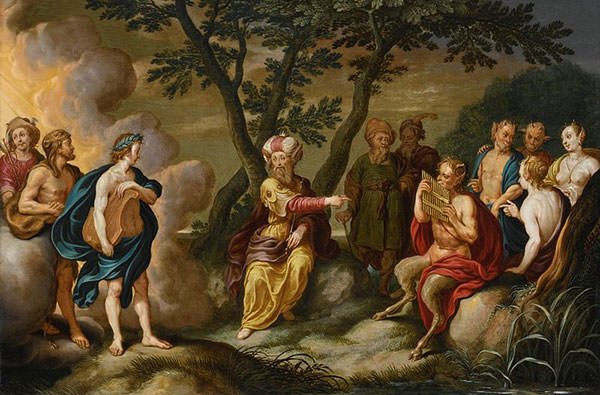
#7 Apollo And Daphne
Daphne was a female nymph associated with fountains, wells, springs, streams, brooks and other bodies of freshwater. Apollo once told Eros, also known as Cupid, to leave war-like weapons to mighty gods like him and stick to his own pastimes, devaluing the duty of Eros to inflate love and passion in others. Infuriated by his statement, Eros decided to take revenge. He prepared two arrows: one of gold and one of lead. The gold arrow pierced the heart of Apollo inflaming in him deep love for Daphne, while the lead arrow struck Daphne creating an intense aversion for love in the her heart. The deep infatuation made Apollo chase Daphne against her wishes. When he started to catch up with Daphne in the chase, she prayed for help to her father, the river god Peneus. Peneus answered her plea and turned her into a laurel tree. Apollo was heart-broken and to remember her forever, he made the laurel a customary symbol of tribute to victorious generals, athletes, poets and musicians, worn as a chaplet on the head. The myth of Apollo And Daphne explains the origin of the laurel tree and its connection with Apollo. Moreover, the myth has been examined as a battle between chastity (Daphne) and sexual desire (Apollo).
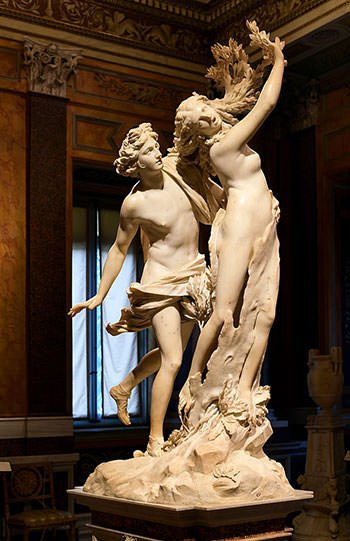
#8 Apollo and Cassandra
Cassandra, or Kassandra, was the daughter of King Priam and Queen Hecuba of Troy. She was very beautiful and was admired by Apollo. Cassandra promised to return his love but on one condition: he should give her the power to see the future. Apollo granted her her wish but she went back on her word and rejected him. The enraged Apollo could not revoke a divine power. So, he decided to make it a curse. He cursed Cassandra that even though she would be able to see the future, no one would believe her prophecies. There is another version of the myth by which Cassandra broke no promise but was given the power by Apollo as an enticement. However, when it failed to win her heart, he converted it into the above mentioned curse. Cassandra became a figure of epic tradition and of tragedy; and her name continues to be used as a rhetorical device to indicate someone whose accurate prophecies are not believed.
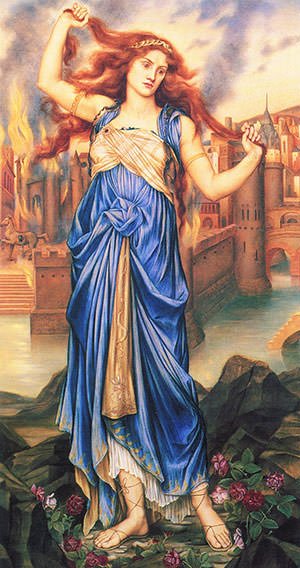
#9 Apollo And Hyacinth
In Greek mythology, Hyacinth was a divine hero and a very beautiful Spartan prince. Being the favorite male lover of Apollo, the Greek god taught him the use of bow, music and the art of prophecy. One day, Apollo was teaching him the game of quoit or discus throw, which involves the throwing of metal, rope or rubber rings over a set distance. They decided to have a friendly competition by taking turns to throw the discus. Apollo threw it with such strength that the discus slit the clouds in the sky. Hyacinth frantically ran behind the discus to catch it and impress Apollo. However, as the discus hit the ground, it bounced back, hitting Hyacinth’s head and killing him instantly. Out of deep grief due to the accidental death of his lover, Apollo created a flower out of the spilled blood and named it Hyacinth. Hyacinth was later resurrected and taken to heaven. The festival Hyacinthia was a national celebration of Sparta, which commemorated the death and rebirth of Hyacinthus.
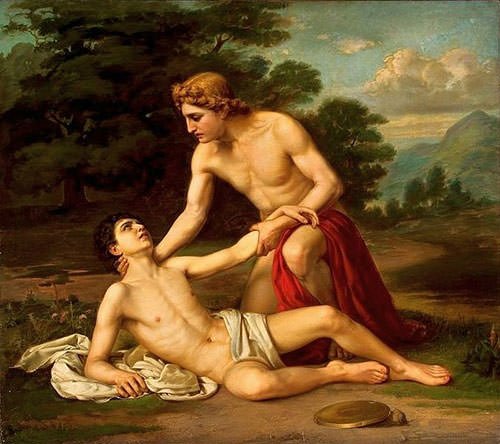
#10 Apollo In The Trojan War
Apollo in Homer’s epic The Iliad plays an important role in some of the key events in the Trojan War which was waged against the city of Troy by the Greeks. During the Trojan War, Apollo sided with Troy mostly because Agamemnon, king of Mycenae had captured Chryseis, the daughter of Apollo’s priest Chryses, and refused to return her. When the priest prayed to Apollo to punish the Greeks for refusing to give back his daughter, Apollo heeded to his prayer. The Greek God shot an arrow infected with plague into the Greek encampment, spreading the disease among the Greeks. Thereafter, King Agamemnon had no choice but to return Chryseis to Apollo, to prevent further wrath of the god. In another instance, Apollo favored the Trojan hero Hector and provided him with newfound strength that helped him kill Patroclus, a close wartime companion of Achilles, by stabbing him in the stomach with a spear. Later, after Achilles slayed Hector in a face-off, Apollo caused Achilles’ death by guiding Paris, the prince of Troy, to strike an arrow on his heel.

